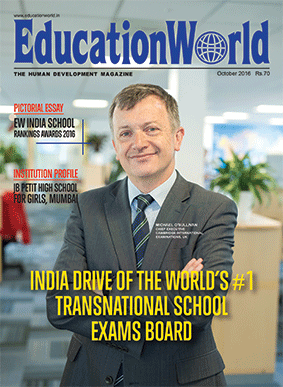 The cover story profiling the UK-based Cambridge International Examinations (EW October) was enlightening. The diligent and meticulous manner in which this exams board revises and updates its syllabuses every six years is an example to our Indian exams boards, particularly state boards. Sadly in India, most state boards revise syllabuses after 15-20 years and even then, it’s a ritual process involving faux educationists chosen by politicians and bureaucrats. Important stakeholders such as academics, parents and teachers, and industry leaders are seldom consulted. That’s why a majority of our school-leavers are ill-prepared for university education, and subsequently the workplace.
The cover story profiling the UK-based Cambridge International Examinations (EW October) was enlightening. The diligent and meticulous manner in which this exams board revises and updates its syllabuses every six years is an example to our Indian exams boards, particularly state boards. Sadly in India, most state boards revise syllabuses after 15-20 years and even then, it’s a ritual process involving faux educationists chosen by politicians and bureaucrats. Important stakeholders such as academics, parents and teachers, and industry leaders are seldom consulted. That’s why a majority of our school-leavers are ill-prepared for university education, and subsequently the workplace.
In his interview, CIE chief executive Michael O’Sullivan says the Cambridge-based board is advising several national governments to formulate their school syllabuses. Therefore, it would be advisable for India’s laggard state governments to elicit CIE’s help in designing syllabuses and also formulating assessment systems which go beyond the sudden death final exams which test and reward rote memorisation.
In today’s globalised world, it’s not good enough for our students to shine nationally. They must be prepared to compete with the best worldwide.
Sundar Rao
Hyderabad
Wrong category
In your EducationWorld India School Rankings 2016 published in September, you have ranked day, boarding and international schools separately. Unfortunately, you have listed Ramakrishna Mission Vidyapith, Deoghar under the co-ed day schools category. Please note we are a boys boarding school affiliated with CBSE.
Please issue a corrigendum in your next issue.
Swami Tyagarupananda
Secretary, Ramakrishna Mission Vidyapith, Deoghar, Jharkhand
We regret the error — Editor
Bitter surprise
In the EducationWorld India School Rankings 2016 (EW September), DPS, Indira Nagar, Lucknow is ranked #10 in Uttar Pradesh and #6 in Lucknow in the co-ed day schools category. This ranking has come as a bitter surprise to us as our school has always performed well in the areas of curricular and co-curricular education. In 2015, our school won great laurels and accolades. Even your magazine had ranked us #4 in Lucknow city and #8 in the state in your survey last year.
It’s strange that no one from your end came to collect our data in spite of various reminders. It is ironical how the results have been declared when the information still rests with us. Where is the authenticity of your rankings?
Ghazala Afsar
Principal, Delhi Public School, Indira Nagar, Lucknow
All schools in the league tables are rated and ranked according to the perceptions of an independent, variable sample of respondents. Please see page 42 of our September issue for the rankings methodology — Editor
Brexit opportunity
Thank you for your brilliant editorial on unwarranted Brexit apprehensions (EW August). It is wise as it is succinct, and as always most beautifully written. It was a joy to read an example of English writing at its best.
Your points are very well made. I really don’t know why the self-styled intellectuals tend to be so dismissive of imperial achievement at its best. A common link language, legal system, training of an elite that could govern the country after independence, introduction of British educational standards and schools have done much to give India the potential to become the great power that it is surely destined to be. A United States of Europe is not only doomed but a totally alien concept to this island race and its history as a global trading and imperial nation.
Moreover with a first class degree and a Ph D from Cambridge under my belt, I deeply resent the superior attitude of academics who condemn those who like me, voted for Brexit as uneducated, small-minded ignoramuses “who should not be allowed to vote”, as one particularly arrogant professor said.
Now the United Kingdom has, as you say, a wonderful opportunity to recover its pride, self-reliance and energy and join with the English-speaking world of its old Empire. It is so heartening to read your confidence about how much this country still has to give, not least in education. The mutual benefits of close collaboration in both trade and culture between the UK and India and all the Commonwealth, are surely enormous.
Dr. Peter Greenhalgh
Kent, England